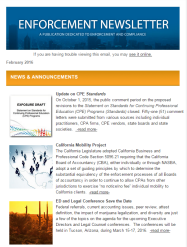Enforcement NewsletterFebruary 2016The California Legislature adopted California Business and Professions Code (CBPC) Section 5096.21 requiring that the California Board of Accountancy (CBA), either individually or through NASBA, adopt a set of guiding principles by which to determine the substantial equivalency of the enforcement processes of all Boards of accountancy in order to continue to allow CPAs from other jurisdictions to exercise "no notice/no fee" individual mobility to California clients. The development of the Guiding Principles of Enforcement by the Enforcement Resources Committee was a key element in assisting the California Board in meeting its legislative mandate pursuant to CBPC Section 5096.21, as well as a significant advance in cross-border accountancy regulation. The CBA and NASBA recognize that the enforcement process of each jurisdiction will vary based on many factors that are specific to the particular Board, such as number of licensees, number of complaints/cases, authority vested in the Board, delegation of certain phases of enforcement to other agencies, and interaction with an umbrella agency.
The Guiding Principles identify the characteristics of an active and effective enforcement process, thereby enabling all state Boards to have confidence that other jurisdictions have a proactive culture of enforcement which successfully regulates the profession and protects the public consumer. In the environment of CPA mobility, Boards who are allowing CPAs licensed in other jurisdictions to provide services to their consumers through mobility have a vested interest in ensuring that the enforcement practices of other jurisdictions meet or exceed the objectives of the Guiding Principles. Consumer protection and disclosure of disciplinary data were important aspects of the development of the Guiding Principles, and Boards have used these Guiding Principles to review and in certain cases enhance their enforcement practices and policies. The California law requires that discipline be available on-line by a "flag" indicator either tied to the licensee’s record on the Board’s licensee look-up tool or on CPAverify.org (the public facing version of ALD). NASBA will work with boards that do not currently have information available on-line to create a feed for CPAverify/ALD that will provide the necessary disciplinary flag. This step improves the disciplinary information that is available to other boards as well as to citizens in all jurisdictions, improving the consumer protection aspect of mobility. As of January 2016, twenty seven (27) jurisdictions have been found to have enforcement practices which are substantially equivalent to the Guiding Principles. Additionally, ten (10) jurisdictions are also substantially equivalent but lack the disciplinary flag required by the California legislature. Further review of the enforcement practices of the remaining eighteen (18) jurisdictions is on-going. |
Full Newsletter |


